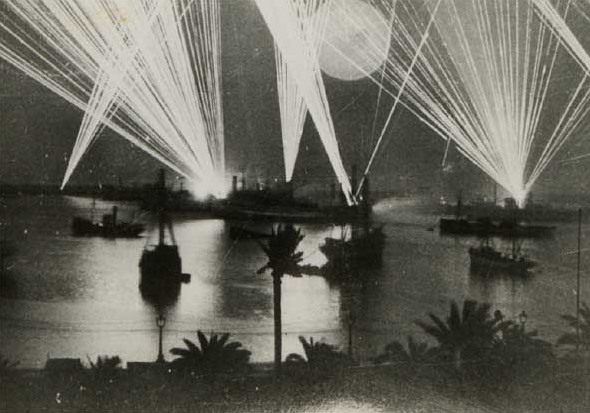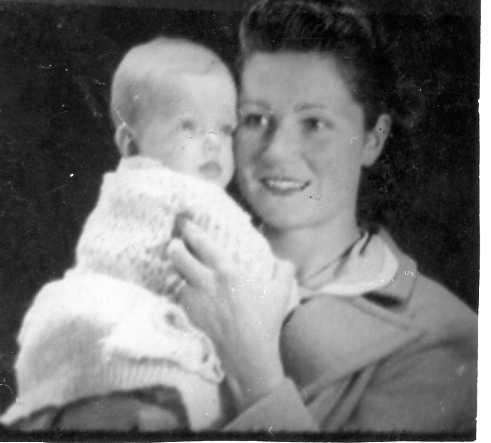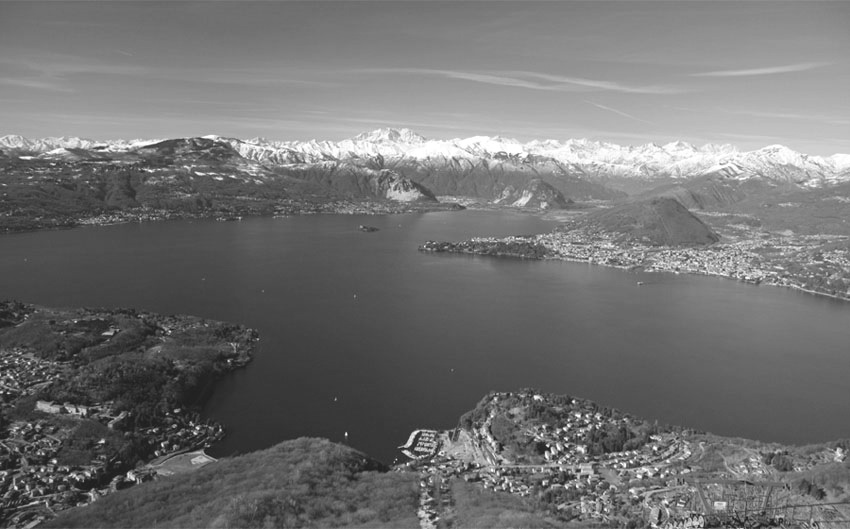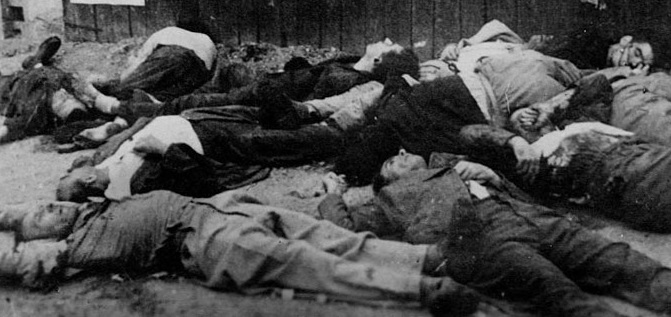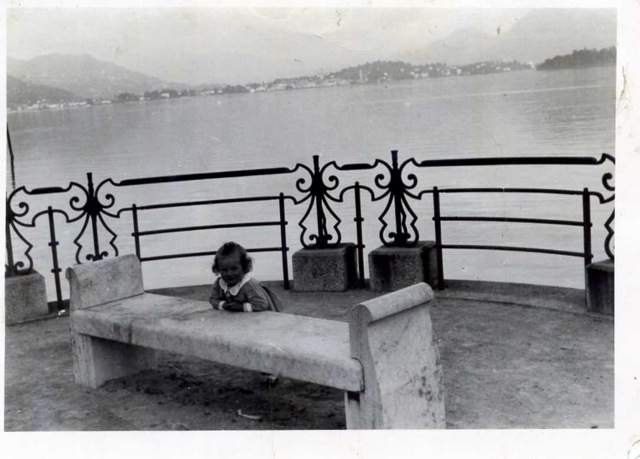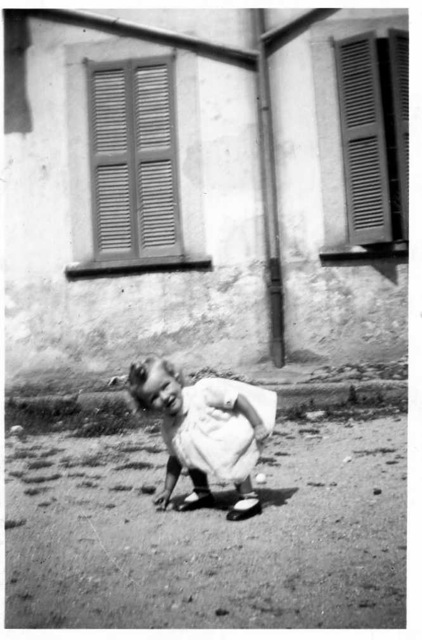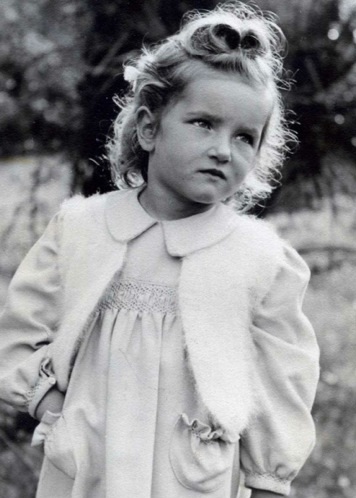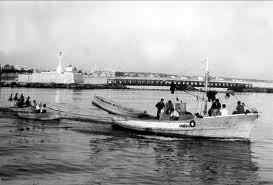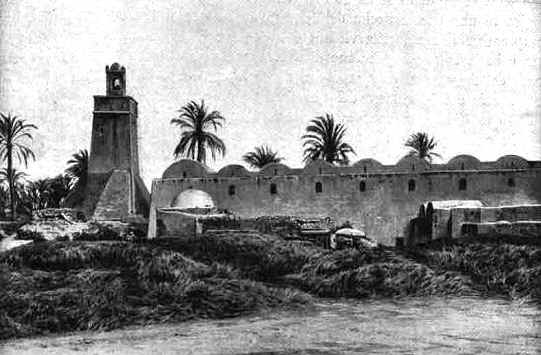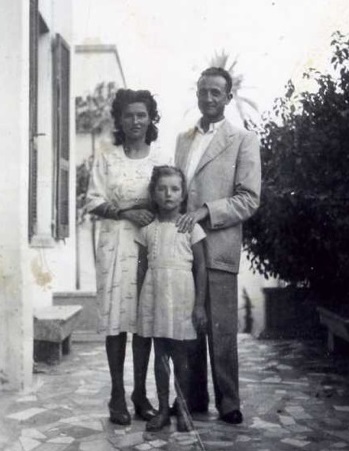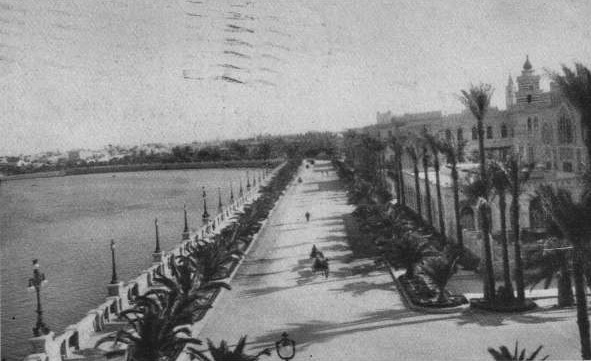| LA STANZA di Camilla De Micheli Consuelos |
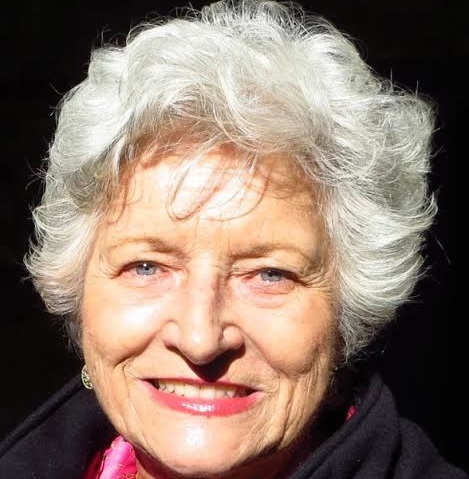 |
| Camilla De Micheli Consuelos |
I was born in Tripoli, Libya, on the 20th
of September 1940, during the Second World War, when Libya was still an Italian
colony. Tripoli, because of its strategic position in the
Mediterranean Sea, was occupied by the German Army, our allies at that time.
For this reason the British and their allies wished to conquer it, and to do
so subjected us to heavy aerial and naval bombardment. The sirens sounded
frequently to warn the population of impending attacks, forcing them to seek the
protection of the bomb shelters.
Many people lost their lives and numerous
buildings were destroyed in these raids. These constant bombing raids caused
the Italian Government to recommend the evacuation of all Italian women and
children from Tripoli. My parents never imagined that the war would last five
years and thought that the evacuation would not be necessary. However, following
an episode during which my mother, Anselmina, and I were miraculously saved
from certain death, they were convinced of the very real necessity to go. It
happened in this way. Whilst my mother, with me in her arms, was in the queue
at the grocery store waiting to be served, she suddenly had a premonition of
danger, and with it an impellent desire to leave the shop immediately. She
asked the lady in front if she might be served first. The lady kindly agreed
and my mother bought a few things and left the shop as fast as she was able.
She had only gone a short distance when she heard an explosion and looking back
saw the building where the grocery store had been located crumble to the
ground. Without any warning the building had been hit by a bomb. *** My
mother and I left Tripoli in the August of 1941. I
was eleven months old at the time. We left, with many other women and
children, on a German Military Air Transport plane. During the flight
we were attacked
by a British R.A.F. fighter plane and we were shot at with machine guns. As a result of this attack our plane was forced to
make an emergency landing at Castelvetrano, near Trapani ,on the island of
Sicily. This had not been our original destination and we were forced to stay
overnight. The only place my mother found available was a small space under a
stairwell that a kind tavern owner had found for us. The bed had no mattress
but my mother made it more comfortable to sleep on by covering it with all the
clothes she had packed in our suitcase. The next morning we resumed our journey northwards by
train. My mother’s family lived in Baveno, Lake Maggiore, very close to the Swiss
border. The journey was a difficult one for my mother. With an eleven month old
baby to nurse and diapers to change she had the added responsibility of our
safety.
In all it took
six days to reach our destination, a journey that normally would have taken
only a day and a half. Holdups occurred frequently along the track as many of
the railway bridges had been destroyed in the air raids. Where a bridge had
collapsed we were obliged to get down from the train and be ferried across the
river in a small boat. There we had to wait for hours until another train could
be brought to pick us up and we could continue our journey.
Baveno is located in the Valle d’Ossola. The town was very well known at that time not only
because it was occupied by the German Army but also because it was the
Gestapo’s headquarters in Northern Italy. The Gestapo had requisitioned a very
large hotel on the Lungolago, the beautiful promenade situated along the
lakeshore.
Those difficult war years were horrible not only for
my mother, but also for her sister and her mother. My grandmother and my aunt
were also alone as my mother’s three brothers had enlisted in the Army. Her
youngest brother was killed in France at the age of 21 and the other two
suffered serious injuries, one in Greece and the other in Russia. Both,
fortunately, had been hospitalized in Military Hospitals and repatriated at
the end of the war. My mother often remarked that we had fallen “from the
frying pan into the fire” and that we might have been better off if we had
remained in Tripoli. She suffered greatly because of the separation from my
father, Giuseppe. It was two years before she had news of him, but finally,
through the Red Cross, she began to receive censored letters, which provided
her with a little comfort. I too was also very sad because I had no personal
memory of my father, having been only 11 months old when we left Tripoli. I
only knew him through photos my mother showed me and the detailed descriptions
she made of him. During the five years of our separation from him I missed his
presence greatly and longed to have him near me so that I could hug and kiss
him. ***
Not only were we living in extreme hardship during
those years in Baveno but we also witnessed the atrocious events that took
place there. The limited amount of food that was available was rationed. There
were also the partisans that had taken refuge in the mountains nearby who often
carried out raids against the Germans, raids that always ended tragically. We
witnessed the total extermination of the Polish and Russian Jews, who had
lived for many years in the beautiful houses situated along the lake shore. Our
freedom was curtailed by the curfew imposed on us that began at 7pm along with
the mandatory blackout from dusk until dawn, and throughout, we endured continuous raids by the SS. The situation
grew worse with the outbreak of the civil war with all its horrors and
atrocities. The memory of
events became impressed more clearly in my mind after my fourth
birthday. Three episodes I will never forget.
The first happened one afternoon whilst I was with my
mother at the lakeside, near the headquarters of the Gestapo and the Baveno
church. We suddenly heard the sound of
gunfire coming from the direction of the church tower. The shots were
directed at an open German military jeep that was coming out of the hotel gates. My mother
immediately hid under a camellia bush, protecting me with her body. The German
officer sitting in the jeep was killed. Within a few minutes a group of armed
German soldiers appeared on the scene. The sniper, who must have been a
partisan, was never caught but the Germans randomly arrested 13 people who, by
misfortune, just happened to be there, and put them up against a wall and shot
them. At that time the rule was that for every German killed thirteen Italians
would be shot instantly. These thirteen people were left on the ground for
three days and nobody was allowed near them. They were then collected by a
bulldozer, the bodies put in a truck, and then buried in a mass grave. This
grave was constantly guarded so no one could exhume the bodies until they were
unrecognizable.
I was the involuntary protagonist in the second event
because I inadvertently caused a dangerous reaction from a German soldier. A
German patrol had been marching past on the street below our apartment and, with
the curiosity of a child, I watched them, peering through railings of our balcony that overlooked the
street. A soldier looked up and saw me. With innocence I smiled at him. A few minutes later, having found out which
apartment the balcony belong to , the soldier furiously banged on our door. At
that moment my mother and I were alone in the apartment. Shaking, she opened
the door. The soldier, his gun aimed at us, shouted in his broken Italian,
“You teach little girl mock Germans”. He shoved her aside, entered the
apartment and inspected every room . He then seized the food we had jealously
stored in the apartment. I was very precocious like all the children of my age
who had to grow up quickly because of the war and I felt that we were in
imminent danger. Instinctively I caressed his hand and told him, “You do not
understand. I was not teasing you. I was smiling at you and when you looked up
I was filled with a lot of tenderness because of your beautiful blue eyes”.
Stunned, the soldier dropped the food he had stolen and, without a word, turned
on his heel and left us.
The
third event happened during the chaos and violence of the civil war.
The war instigated behavior that owed nothing to the real cause of the
war. Inconceivable acts of
revenge, recriminations, retaliations and abuse of power were committed. I was playing in the
courtyard with my mother watching me from our balcony. All at once four young
partisans, each recognizable by the red scarf he wore, around his neck, ran into
the courtyard. They grabbed a young girl who, as everyone knew, was engaged to
a fascist. They carried with them a can filled with melted tar , scissors and a
razor. Their intention was to shave her head and cover it with tar. I kicked
them furiously while my mother shouted as she ran to the aid of the poor girl.
Other neighbors, on hearing the screams, ran to help. The partisans panicked,
let the girl go and ran away. Many girls were victims of outrageous acts such
as this. With their scalps covered in tar they were bald for a long time and
so were easily recognized and teased, as
well as being abused, both verbally and
physically.
*** The war finally ended
in 1945, but before that, in 1943, the
defeated Italian and German troops had to leave Libya. The Italian jurisdiction
of the colony ended and it passed under the British Military Administration.
The borders were closed and no one could enter or leave the country. The
impatience on the part of the thousands of women and children who wished to
join their husband and fathers created a clandestine transportation system using
fishing boats from Siracusa (Sicily) to
the coast of Libya.
With
the aid of coded letters my parents eventually agreed that we should return to
Libya using this form of transport . My father paid a huge sum of money for our
fare. In the August of 1946 we reached Siracusa and were instructed to stay in
a specific hotel. We had to wait there for a night suitable for the trip when
the moon was in the right quarter. This night occurred after six days of
waiting and we were woken up at three in
the morning of the seventh day and led ,in the dark, to an unknown location.
Here there were fishing boats moored and to board the fishing vessel that was
to take us we had to pass silently from one moored boat to another.
My mother panicked
when she saw how small our boat was but with courage did not refuse to board. We went down into
the hold where, according to her, we could be more protected from the wind and
waves.
At dawn we approached a reef where many more women with children waited to board our boat. The boat settled lower in the water as each person boarded. It became so loaded down that the level of the water reached just a meter from the gunwales. During the crossing passengers were drenched by the waves that breached the boat. The Straight s of Malta, where the sea is always very rough , was the most dangerous stretch of all, but the captain was a skilled sailor and the crossing went without mishap. After three dreadful days we approached the shore of Tagiura, on the Libyan coast some distance from Tripoli. Finally we had arrived ,miraculously, safe
and sound!
The
boat anchored off the beach as there was nowhere to dock and we were all
ferried by rowing boat to the shore. The
rowing boat had to make countless trips, but once the transfer was completed
the fishing vessel upped anchor and left us all stranded on the beach.
Within fifteen
minutes a British Naval Patrol arrived with armed troops to arrest us for
illegal entry into the country. It all seemed as if it had been prearranged.
Under threat of their weapons we were ordered to make a line. Although
we were already exhausted we had no choice but to obey. We then had to march
under a scorching sun on the soft sand for at least an hour. My mother carried
me in her arms whilst also carrying our luggage, and every so often splashed
seawater on my face to cool me down.
We finally arrived at
a paved road where there were military trucks that were waiting for us. They
transported us to a prison camp in which many other women and children were
also held as illegal immigrants. We were registered and then led to some barracks where we found beds made of steel bars but no mattresses. We were kept constantly under guard by Sudanese troops armed with machine guns. There was one kind and compassionate guard that my mother found and convinced to help us in exchange for one of her precious rings. She asked him to contact my father and let him know where we were. He was so kind that one morning he allowed us to pass several guard posts until we reached the huge rolls of barbed wire fencing that formed the perimeter of the camp. On the other side of the barbed wire we found my father waiting for us. An indescribable emotion came over me when I saw him. It was
the first time I had seen him since we left Tripoli five years and one month
before. I was now six years old and although we were so near to him I still
could not touch or hug him.
During this occasion
my parents planned our next move. They agreed to seek legal help. We remained
in the prison camp for an additional 15 days where they fed us something that
resembled soup. My father hired an attorney who bailed us out and we were
released on probation. My father came to pick us up in his car. Due to the
intense emotion of our reunion we found we were unable to talk but through
tears and embraces our hearts were filled with immense joy. I shall never
forget that extremely emotional reunion. It was one of the most happiest
moments of my life. We were finally
reunited!
Every morning my
mother had to report to the police station and sign a
register, because legally she was still on probation. In
the meantime the
borders were opened and by the time she had to appear in court
all charges were dropped. If we had known about it earlier we would not
have
risked our lives and endured so many difficult moments. * * * The years that
followed from 1946 till 1951, the year we all returned to Italy, were the most
carefree and happy of my childhood. It was spent in that wonderful city that Tripoli was at that time,
which I have never been able to see again but that I will never forget!
Camilla
De Micheli Consuelos tconsuelos@mac.com
|
